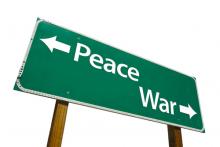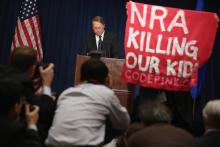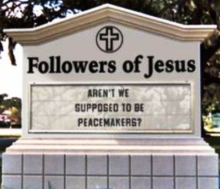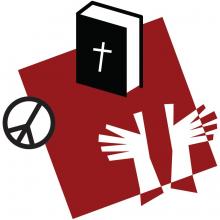Some messages are worth retelling.
Peace and Nonviolence

Michael Boyle, an assistant professor at La Salle University, who served on President Obama’s counter-terrorism advisory group during the 2008 campaign, has written a new, critical article on drones for the journal International Affairs.
The Guardian reports:
“The United States' use of drones is counter-productive, less effective than the White House claims, and is 'encouraging a new arms race that will empower current and future rivals and lay the foundations for an international system that is increasingly violent,' according to a study by one of President Obama's former security advisers.
“Michael Boyle, who was on Obama's counter-terrorism group in the run-up to his election in 2008, said the US administration's growing reliance on drone technology was having 'adverse strategic effects that have not been properly weighed against the tactical gains associated with killing terrorists.'"

The secrecy of the U.S. drone program often makes it difficult to follow what is happening. News reports cite unnamed intelligence or security officials, sometimes tribal sources, usually with different information.
For example, on Sunday a large number of people were killed by drone strikes in Pakistan's South Waziristan region. The story was reported by Al Jazeera, Reuters, DAWN, Associated Press, and CNN; among others.
The strike involved “several missiles” (AP), “eight to 10 missiles” (Al Jazeera), or “four unmanned drones fired ten missiles” (DAWN). It was aimed at “a suspected Taliban compound” (Al Jazeera), “three Taliban compounds” (Reuters), “three militant hideouts” (AP), or “three houses” (DAWN). The casualties were “sixteen killed and several others wounded” (Al Jazeera), “seventeen dead, three wounded” (CNN), “between ten and twelve dead” (Reuters), “seventeen dead” (DAWN), or “nine dead” (AP). They were “believed to be militants” (CNN), “suspected to be Taliban fighters” (Reuters), or “fighters belonging to the Punjabi Taliban” (Al Jazeera),
So, how many people were killed? Who were they? You decide.
ON A BLAZING August day last summer, Rosa Pérez Triana faced a crowd of several hundred people in downtown Tucson and held up a color photo of a pretty young woman.
“This is my daughter, Coral,” Pérez said in Spanish, her voice breaking. “A year ago she went missing. There are thousands of people in Mexico like me who don’t know what happened to their loved ones.”
A middle-aged woman from the violent state of Nuevo León in northern Mexico, Pérez had come to the United States with the Caravan for Peace with Justice and Dignity to tell her North American neighbors what had happened to her daughter—and to an estimated 80,000 other Mexicans who have been killed or disappeared during the country’s six-year-old war on drugs.
Her daughter’s story is typical. Guadalupe Coral Pérez Triana vanished on July 24, 2011, somewhere on the road between Reynosa, Tamaulipas, and Monterrey, Nuevo León. Five other young women were traveling with her. All are missing and presumed dead.
“The main purpose of the caravan is to show a human face,” explained Laura Carlsen, director of the Center for International Policy’s Americas Program in Mexico, who joined the caravan on its last leg through the East Coast. “These are people whose family members were victims.” Such are the human costs of the war on drugs that the U.S. government supports with arms and money.
EACH DAY REV. JAMES BYENSI seeks the face of God in one of the world’s deadliest places, an environment where rape has been used as a weapon, children have had their innocence stolen, and the church of Jesus Christ is called to stand in the gap.
He lives in Bunia, a town on the eastern edge of the Democratic Republic of Congo (DRC). And while only the largest events of the DRC’s conflict—such as the M23 militia’s takeover of Goma, a city 300 miles south of Bunia—make world headlines, every day Byensi engages his community and country as an active agent of peace. For example, recently he helped deter a cycle of violence from escalating in his hometown. “Even as I write, I have just received a call from the mayor to join him in talking to a group of people who are protesting against the killing of their brother last night,” Byensi told Sojourners in October in one of several email interviews. “The killers were one of the rebel groups operating in the area surrounding Bunia.” While advocacy against violence is a cause close to Byensi’s heart, the protest itself threatened to become part of the problem: “Protest in this area is always violent and followed by looting or even rape,” he explained. The result of that meeting was that Byensi and the mayor together “devised the way to address the people and cool them down,” which included the mayor’s office helping the bereaved citizens with burial expenses.
That is the kind of advocacy and justice work Byensi does on a daily basis as a leadership and conflict-management consultant and trainer, and through the nonprofit he founded, the Rebuilders Ministry.
DURING THE BALKAN war of the early ’90s, I traveled twice to Bosnia and Croatia. I visited middle-class women whose husbands and sons had been brutally killed. I visited a refugee center filled with people who had lost everything and were at the mercy of any country that would take them in. I visited school children suffering from post-traumatic stress after seeing their parents killed by enemy shells that landed in their homes.
I walked through the rubble of Mostar, where the Friendship Bridge—a massive stone structure named in honor of the many ethnic groups that had crossed it for four centuries—had been bombed and destroyed. In city after city, I saw the destruction of architecture, art, museums—a violent erasure of the cultures that had thrived there.
It was the first time I had seen war up close, and I was shocked by what human beings do to each other.
While I traveled in the Balkans, another war was waged in Rwanda by Hutus against Tutsis—what we now refer to as the Rwandan genocide. Since 2009 I’ve traveled twice to the Democratic Republic of Congo, where the ethnic battles forged in Rwanda crossed borders and continue to this day. As usual in war, civilians pay the highest price. Subsistence farmers in small villages want only to live in peace, tend their crops, and feed their families. Instead, their crops are burned, wives and daughters are raped, and many become slave labor in Congolese mines that provide minerals for our cell phones and wealth for the violent criminals who control the mines.
A VARIETY OF EVANGELICAL peacemaking efforts have sprung up in recent years, from the Two Futures Project, which seeks a world without nuclear weapons, to the World Evangelical Alliance’s Peace and Reconciliation Initiative, which seeks to redress the fact that “in our zeal for evangelism, we have often overlooked the biblical mandate to pursue peace.”
This fall, evangelicals from a range of viewpoints gathered at Georgetown University in Washington, D.C., exploring what a distinctive evangelical contribution to peacemaking might look like. The essays below, unless otherwise noted, are taken from the first Evangelicals for Peace conference, a “summit on Christian moral responsibility in the 21st century.” Organizers hope to publish a book with the entire collection of talks. —The Editors
-----
‘All the Easy Jobs Have Been Done’
Standing on a rich tradition of peace and transformation
by Geoff Tunnicliffe
WHY IS PEACEMAKING an important topic for evangelicals? As a global community of 600 million Christians, our churches are confronted daily with the impact of illegal weapons. Our hospitals treat the victims of violence. Our church leaders counsel the traumatized. All forms of conflict negatively impact our development programs. Our aid agencies seek to care for and rehabilitate child soldiers. Our inner-city communities are confronted with the outcomes of gang warfare.
For all of us who say we are followers of Jesus, as we observe or experience the brokenness of our world, it should break our hearts. If we feel the pain so deeply, I can’t imagine what our loving God feels. The One who is called the Prince of Peace. The One who laid down his life, so that we could be reconciled to God and each other.
The World Evangelical Alliance’s engagement in peacemaking stands on the rich traditions of evangelicals who have devoted themselves to being instruments of social change and transformation. We want to say loudly that we evangelicals want to be on the forefront of peacebuilding. All the easy jobs have been done. It’s just the tough ones that are left. It requires clear vision to face these challenges.
We as evangelicals are committed to working together with those in and outside our community for the good of all. May God empower us through the work of his Spirit to be his ambassadors of peace and reconciliation.
AMID THE COUNTRY'S serious fiscal problems, our $775 billion annual defense budget, not to mention our tens of billions of dollars spent on intelligence and other national security expenses, is treated as sacrosanct. Budget-cutters, especially on the Republican side, do not train their sights on the defense budget as they seek to address our flood of red ink, but instead focus on dramatic cuts in the safety net for the poor.
According to former Reagan budget director David Stockman, our $775 billion defense budget is nearly twice as large in inflation-adjusted dollars as the defense budget of Dwight Eisenhower for 1961, during the Cold War. Our FY 2011 defense budget was five times greater than that of China, our nearest competition for this dubious honor; constituted over 40 percent of the world’s entire military spending; and was larger than the cumulative budget of the next 14 nations in the top 15. All of this occurs at a time when our infrastructure is crumbling, our schools are sliding, and one-sixth of our population cannot find or has stopped looking for full-time work.
Stockman suggests that no plausible national defense goals today justify this level of defense spending. He rightly points out that “we have no advanced industrial state enemies” akin to the USSR of Cold War days. He argues that what in fact supports a budget of this size is an ideology of “neoconservative imperialism” and an attempt to function as a “global policeman” even after the world has “fired” us from this role.

IN THE U.S., the Cold War has served to justify a permanent wartime economy, blacklisting and surveillance of dissenters, and military interventions against smaller and weaker nations from Vietnam to Nicaragua. In the Soviet Union, it has been used to excuse a permanent state of economic austerity, the imprisonment and torture of dissenters, and military interventions from Hungary to Afghanistan. And on both sides the Cold War has provided the ideological underpinning and political momentum for a nuclear arms race that threatens the future of the entire human family. ...
As Christians our faith, security, and hope for a peaceful world can only be placed in the one true God, who is the creator and sustainer of all life and the Lord of history. The first and most essential commandment forbids us to trust the fate of God’s earth and generations unborn to the creations of finite, fallible, and fallen human beings.

LAST OCTOBER, A historic breakthrough for peace took place in Mindanao. In this region in the southern Philippines, an armed conflict has persisted for more than four decades, killing 120,000 people and displacing millions. Now, after 15 years of peace negotiations between the government of the Philippines and the Moro Islamic Liberation Front, both sides have signed a framework peace agreement.
For generations, Moro (as traditionally Islamic ethnic groups are called here) and indigenous peoples in Mindanao have been politically, economically, and socially left out and marginalized in the Philippines. It is in this context—and the collective desire of the Moro people in Mindanao for self-governance—that both the armed conflict and the peace negotiations took place. The agreement signed in October outlines a pathway toward the establishment of a political entity, Bangsamoro, that will be autonomous, although not fully independent of the Philippines.
The framework agreement is a welcome consolidation of a long-term peace process that has encountered significant challenges, including periods of lackluster support from the international community and a less-than-successful 1996 peace agreement with the Moro National Liberation Front (from which the Moro Islamic Liberation Front is a breakaway group).

WILL THE MASSACRE at Sandy Hook Elementary School touch the nation’s soul or just make headlines for a short time? I think that will be up to us who are parents—to respond as parents.
The brutal shooting of 20 6- and 7-year-old schoolchildren in their own classrooms touches all of us, and as the father of two young boys I’m especially struck by the way it touches parents: from the heartbreak of the parents in Newtown to the tears in the eyes of Barack Obama as he responded—not just as the president but also as the father of two daughters—to the faces of the first responders and reporters who are parents. I have felt the pain and seen the look on the face of every parent I have talked with since this horrendous event occurred. Virtually every mother and father in America has turned their grieving gaze on their own children, realizing how easily this could have happened to them.
The day after the Connecticut massacre, my wife, Joy, and I went to our son Jack’s basketball game. The kids on the court were the same ages as the children who were killed. I kept looking at them one by one, feeling how fragile their lives are.
Our first response to what happened in Newtown must be toward our own children: To be so thankful for the gift and grace they are to us. To be ever more conscious of them and what they need from us. To honor the grief of those mothers and fathers in Connecticut who have so painfully lost their children, we must love and attend to ours in an even deeper way.

The Bureau of Investigative Journalism has a comprehensive year-end report on U.S. drone strikes in 2012, month-by-month and country-by-country.
“Drone strikes in Pakistan are now at their lowest level in five years, as Islamabad protests almost every attack. The CIA also appears to have abandoned ‘signature strikes’ on suspected militants fitting certain patterns of behaviour – at least for the present. Almost all attacks in recent months have been against named al Qaeda and other militant leaders.
“As drone strikes fell in Pakistan they rose steeply in Yemen, as US forces aided a major military campaign to oust al Qaeda and other Islamists from southern cities. A parallel CIA targeted killing programme killed numerous alleged militants, many of them named individuals. Yet US officials took more than three months to confirm that American planes or drones had killed 12 civilians.”

Drone strikes are being escalated in Yemen with the fifth attack in the past ten days occurring on Thursday. Reuters reports:
“At least three suspected al Qaeda militants including a local commander were killed on Thursday in Yemen by a strike from an unmanned aircraft, residents and a local official said.”
Today, in response, Yemeni tribesmen organized a protest in front of a government administration building. According to Reuters:
“Dozens of armed tribesmen took to the streets in southern Yemen on Friday to protest against drone strikes that they say have killed innocent civilians and increased anger against the United States. …
“One tribesman participating in a sit-in in front of the government administration building in Redaa told Reuters by telephone that at least seven innocent civilians were killed in the recent raids.”
Unlike Pakistan, the Yemeni government openly supports the U.S. strikes.

Over the last two days, multiple drone strikes in Pakistan killed at least 13 people. According to the Associated Press,
“Two U.S. drone strikes on northwest Pakistan killed a senior Taliban commander who fought American forces in Afghanistan but had a truce with the Pakistani military, intelligence officials said Thursday.
“The commander, Maulvi Nazir, was among nine people killed in a missile strike on a house in the village of Angoor Adda in the South Waziristan tribal region near the border with Afghanistan late Wednesday night, five Pakistani security officials said on condition of anonymity because they were not authorized to talk to the media. …
“Fighters under Nazir's command focused their attacks on American forces in neighboring Afghanistan, earning him the enmity of the U.S. But many in Pakistan's military viewed Nazir and militant chiefs like him as "good Taliban," meaning they focus attacks only on foreign forces in Afghanistan, keeping domestic peace by not attacking Pakistani targets.”
In a separate drone strike, at least four people were killed early Thursday morning near Mir Ali in the North Waziristan tribal region.
The Nation reports that the Obama administration may be heading toward confrontation with Jerusalem. During the brief war between Israel and Gaza in November, Obama pressured both sides to a truce. After Palestinian Authority president Mahmoud Abbas asked for Palestine observer status at the U.N. General Assmebly, Israel retaliated by expanding settlements on the West Bank. This move ended hope for a two state solution. The Nation notes:
If Obama is planning to put more heat on them, he will undoubtedly wait until after their election. Then, in the late winter months of 2013, before spring comes and Netanyahu can revive the possibility of an attack on Iranian nuclear facilities, the president might well provoke a showdown.
He has good reason. If he can secure a definitive halt to settlement expansion, he can bring the Palestinians back to the table with a promise to press Israel to negotiate seriously for a two-state solution. In a chaotic region where the United States seems to be losing ground weekly, Washington could score sizeable foreign policy points, especially in improving relations with regional powers Turkey and Egypt.
Read more here.
Youcef Nadarkhani, an Iranian pastor imprisoned for nearly three years for “apostasy” until his release in September when the charge was changed to "evangelizing," was reportedly re-arrested on Christmas Day and ordered to serve the remaining 45 days of his prison sentence.
Morning Star News reports:
“An Iranian pastor freed from prison in September after nearly three years of detainment was re-arrested on Christmas Day in a move that human rights groups consider intentional harassment for rejecting Islam. …
“Those close to the case and Nadarkhani’s family said the re-arrest may also have served as a direct message for the pastor to leave the Islamic Republic, according to Jason DeMars of PTM [Present Truth Ministries].
“It appears that it is a move to harass him,” DeMars told Morning Star News. “Perhaps they want him to leave the country permanently.”

What does the birth of the baby Jesus 2,000 years ago have to offer the violent, troubled world we live in? Or what would Jesus say to the NRA?
I want to suggest — a lot. A whole lot.
Jesus entered the world from a posture of absolute vulnerability — as an unarmed, innocent child during a time of tremendous violence. The Bible speaks of a terrible massacre as Jesus was born, an unspeakable act of violence as King Herod slaughters children throughout the land hoping to kill Jesus (which the church remembers annually as the massacre of the Holy Innocents).
Perhaps the original Christmas was marked more with agony and grief like that in Connecticut than with the glitz and glamour of the shopping malls and Christmas parades. For just as Mary and Joseph celebrated their newborn baby, there were plenty of other moms and dads in utter agony because their kids had just been killed.
From his birth in the manger as a homeless refugee until his brutal execution on the Roman cross, Jesus was very familiar with violence. Emmanuel means “God with us.” Jesus’s coming to earth is all about a God who leaves the comfort of heaven to join the suffering on earth. The fact that Christians throughout the world regularly identify with a victim of violence — and a nonviolent, grace-filled, forgiving victim — is perhaps one of the most fundamentally life-altering and world-changing assumptions of the Christian faith. Or it should be.
So what does that have to do with the NRA? Underneath the rhetoric of the gun-control debate this Christmas is a nagging question: are more guns the solution to our gun problem?

For a child has been born for us,
a son given to us;
authority rests upon his shoulders;
and he is named
Wonderful Counsellor, Mighty God,
Everlasting Father, Prince of Peace.
~ Isaiah 9:6
On the flight home from Connecticut, where we’d buried my beloved father a few days before Thanksgiving, I watched the film Seeking a Friend for the End of the World and dissolved into a wailing heap of tears and snot.
The premise of the uneven dramedy starring Steve Carell and Keira Knightley is this: An massive asteroid named Matlilda is on a collision course with planet Earth and in three weeks’ time, the world will come to an end. The main characters and others decide how – and with whom – they want to spend the last days of their lives.
Given recent events, this led to some soul searching on my part. If I had three weeks to live, what would I do? Where would I go? Who would I want to make sure I saw? With whom would I want to share my last breaths?
For most of my life the answer has been the same: I’d want to be with my family and, in particular, with my father.
Which is why I ended up bawling my eyes out for the last 90 minutes of the flight home to Los Angeles, much to the dismay of the fellow in the middle seat next to me.
If I had three weeks to live today, I wouldn’t be able to spend any of those moments with Daddy.
He’s in the More, now. On the other side of the veil. In Heaven. Resting in peace. With Jesus.
And I will have to wait until my earthly life ends to see him again face-to-face.

*If you have not read the Book of Job, this pastor recommends it as a must-read during this time of national crisis. There is much to digest; it requires no theological confession (only a sincere concern for humanity); and it reminds us of how little we know, how much we speak.*
The Book of Job provides a helpful but not fully welcome commentary on how we might read and understand the tragic shooting at Sandy Hook Elementary School. Because that’s what we want right? Understanding? Things happen and we want to know WHY, so as to file them in our Rolodex of infinite human wisdom. Except … Job could do nothing to prevent the tragedies that befell him, and as he sat in the silence of his grief – having just lost his 10 children, his possessions, and his health – all he had was his three friends who came to sit with him. Except … sitting was not enough for them. They had to talk. They had to explain WHY this happened to Job. And in the process they forgot about Job.
Tragedies are always the occasion for extraordinary public debate: New Orleans moved from the victims to the state of FEMA in 2005; Columbine rushed us from victims to gun control; and Darfur moved from victims to foreign policy, as does Israeli-Palestinian conversation today push us away from the exiles themselves. Newtown, Conn., is no different, where a major cable news outlet was waiting in the parking lot to talk to children (not care for children, but talk to them about what was going on inside, focusing on their eyes and ears, but not their hearts). As if a 6 year old can wax eloquent on the horror they’ve witnessed. Sensationally irresponsible: some of the worst journalistic ethics I’ve seen in … well … let’s not go there.

